 Fitzgerald and friends enter the no-go zone. 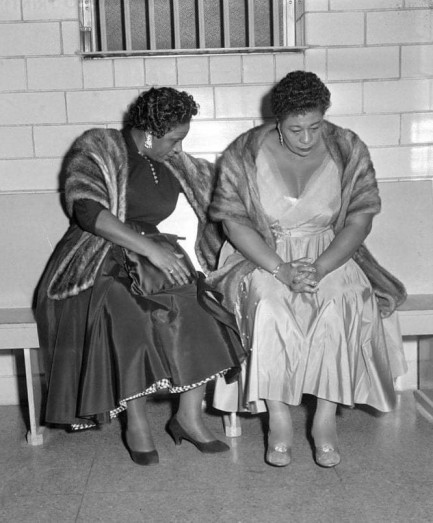
Today in 1955 in Houston, musicians Ella Fitzgerald, Dizzy Gillespie, Illinois Jacquet, personal assistant Georgiana Henry, and concert promoter Norman Granz were arrested, ostensibly for the crime of illegal gambling. Five undercover cops had barged into the backstage area at the Houston Music Hall during a mid-set break and caught Jacquet and Gillespie playing craps. Fitzgerald was having a snack. Henry was nearby, as assistants tend to be. And Granz was arrested for blocking the cops' access to Fitzgerald's private bathroom because he feared they might plant drugs—a trick he'd seen before. The photo shows Fitzgerald and Henry. The despondent singer told gathered reporters, “I have nothing to say. What is there to say? I was only having a piece of pie and a cup of coffee.”
The gambling charge was, of course, just a pretext. Ella and company were actually arrested for playing to an integrated audience. Segregation had been made illegal the year before, but local authorities weren't budging in their attempts to keep the city divided, and jazz music, because of its popularity and tendency to elevate black culture, was feared by the old guard as the thin edge of the wedge of equal rights. Back then, opponents of equality called non-segregated shows such as Fitzgerald's “forced integration,” because whites had no option to partake without mingling with blacks. The phrase is eerily similar to “forced diversity,” which you hear a lot in 2022, and will continue to hear in upcoming years.
Pretext arrests are really about plausible deniability. Even today on fact-checking websites like Snopes, the arrest is not fully labeled an incident of racist harassment. They were actually gambling, goes the logic. But so were thousands of other Houstonians that night, including, probably, cops at poker sessions in their dens. Everyone breaks the law. Policing is about who is targeted. Five of Houston's finest bursting into a private backstage area when no probable cause existed is itself proof that the arrest was harassment. But it's the cops who write the record, and in covering up their true motivations they also get to skew official history. It's the oldest game in the book.
Fitzgerald and her companions weren't taken to jail until after they completed the few songs left in their show, a concession doubtless bestowed in order to prevent the audience from getting riotous. After being released the musicians made it back to Houston Music Hall and played a second contracted show—again, leniency that was probably a crowd control measure, if not a favor to the concert venue itself. The police had accomplished their objective. They'd sent a message and, because news media were present at the jail, had embarrassed the performers nationally. We suspect that Fitzgerald's heart wasn't really in that second performance. It had to be clear to her that no matter what protections blacks were given with a pen and ink in Washington, D.C., actual power in the south flowed from a corrupt badge and the muzzle of a gun.
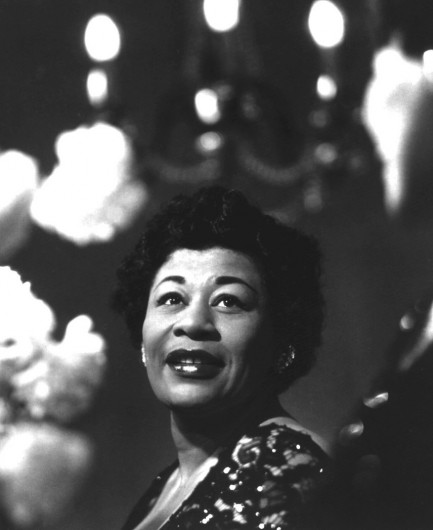 If you want to hear Ella at her magical best, have a listen to this.
 I always knew my movie career would end one day. But I thought it would at least start first. 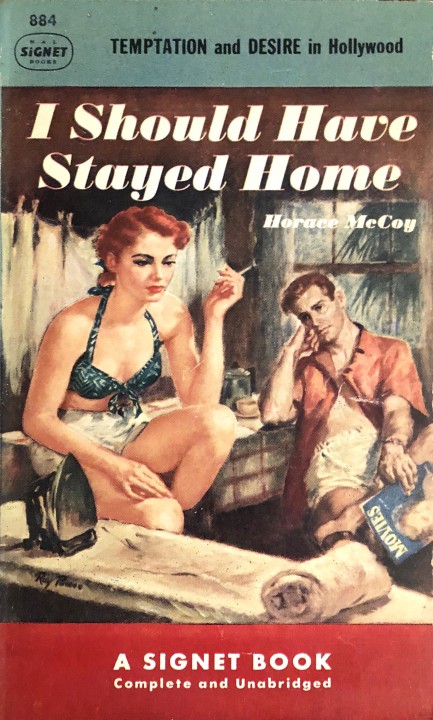
Having spent some years in L.A., and having worked in entertainment there, we're drawn to Hollywood novels. Horace McCoy's I Should Have Stayed Home tells the story of Ralph Carston, twenty-something hot shit from Georgia, who heads out to Hell A. and learns that stardom is not easily achieved. This is a simple and unlayered tale, and considering what we know firsthand can happen in Hollywood, Ralph doesn't actually go through anything earth-shattering. Most of his problems stem from the fact that he's a pompous dumbass. He tries unsuccessfully to make connections, hooks up with a rich cougar who has a sexual fetish, goes to some parties, is warned he can't be a star with his southern accent, spends a few chapters infuriated by an interracial couple he sees at someone's house, battles professional envy, has a bit of strife with his roomie Mona, and deals with tragedy concerning his friend Dorothy. By the end he's grown terminally discouraged and cynical in a town that runs on hope. Dare we say it? He should have stayed home.
 A trapper's job turns into a battle of wits and a test of survival. 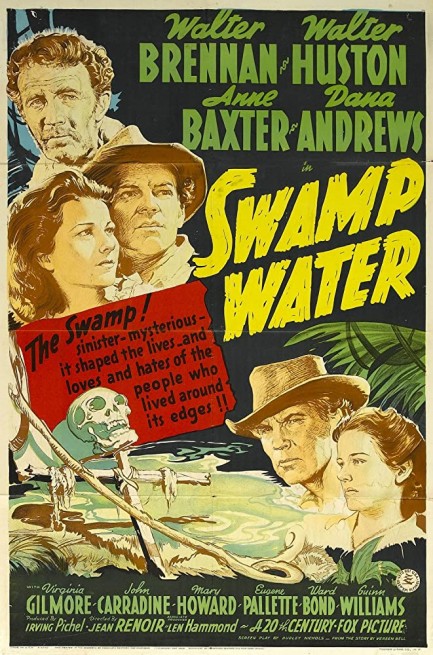
The movie Swamp Water is based on Vereen Bell's 1941 novel of the same name. We read the book a while back and loved it, so having a look at the movie adaptation was mandatory. Jean Renoir directs a heavyweight cast: Walter Brennan, Walter Huston, Dana Andrews, an eighteen-year old Anne Baxter, and even John Carradine. Brennan is the key character, playing a murder suspect hiding in the Okefenokee Swamp. He's considered an all-time great actor, and here he plays a backwoods good ole boy, mouthing dialogue like, “I bet I been cottonmouth bit a dozen times.” When we heard that line we had to laugh, because it prefigures his famous soliloquy from 1946's To Have and Have Not about being “bit by a dead bee.”
There's more excellent dialogue in this. Our favorite line: “It's gettin' so I don't expect nothin' from you 'cept a bossified tongue and a cussin' out.”
While the script is fun, we didn't think Bell's book would be easily adaptable and we were right. One of the pleasures of the novel is its extensive focus on the geography of the swamp, but there was no way that could fit into the film. The air of deep foreboding and mystery is also missing. For those and other reasons what you end up with is a so-so old movie made from an excellent old book. The script closely follows the source material, so if you want to know a bit more about the plot, we posted a short write-up on the novel here. Swamp Water opened across the U.S. in November 1941, but before its national debut had a special premiere in the town of Waycross, Georgia, where much of the movie was made. That was today, 1941. 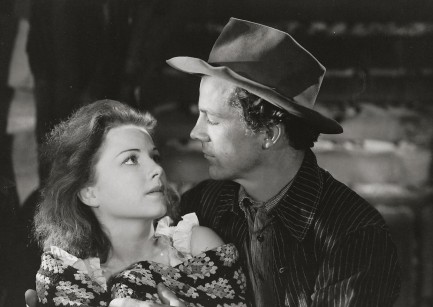 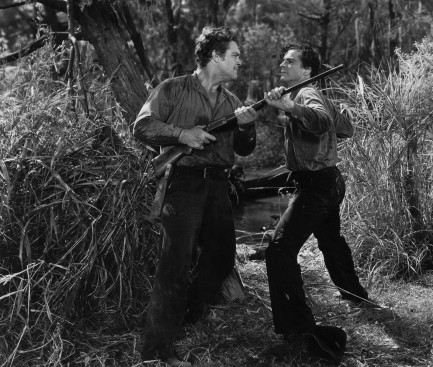 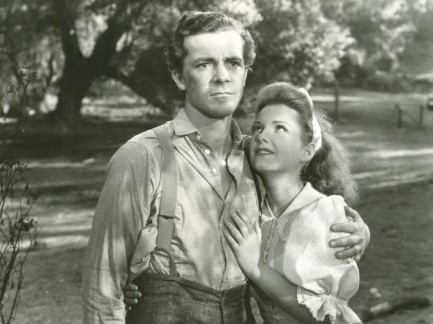 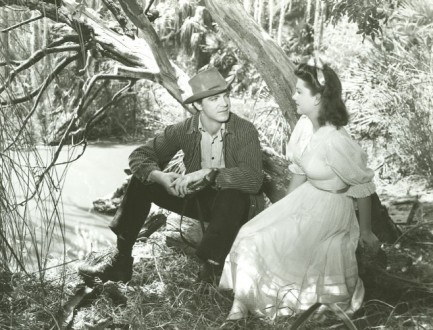 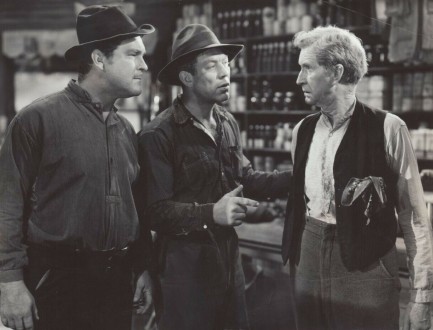 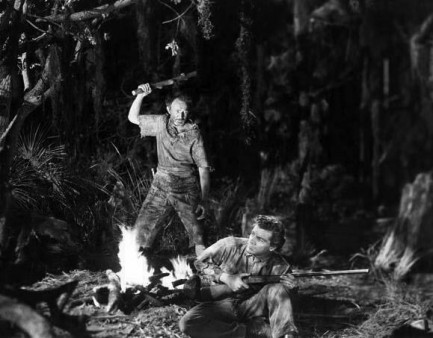 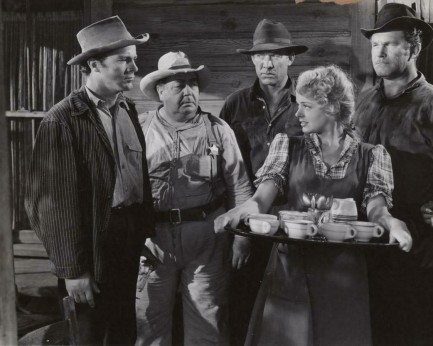 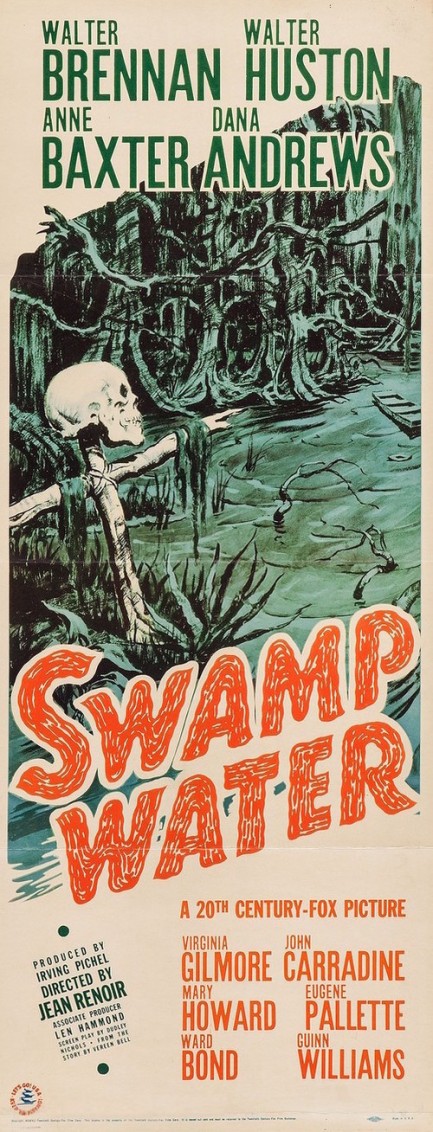
 If you'd just asked for directions like I told you we wouldn't be in this mess. 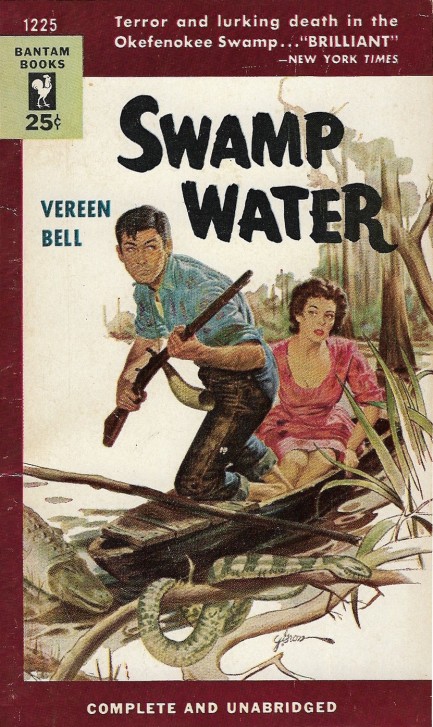
This is a nice acquisition—Vereen Bell's Swamp Water with George Gross art on the front. The book is a rural slice of life novel dealing with a young trapper named Ben Ragan who ventures into the Okefenokee Swamp in search of his lost hunting dog, Trouble. Nobody, aside from Indian tribes of earlier times, is thought to have entered the dreaded swamp and returned. Ragan goes in and finds Trouble—and trouble. Bell expertly catalogs swamp flora, fauna, and topography, which makes for a backdrop so vivid you can almost feel the humidity. This is an extraordinarily enjoyable tale, a sort of a revenge novel/chronicle of the deep South/backwoods adventure, written when the vast Okefenokee straddling Georgia and Florida was nearly uncharted territory. 1941 on this originally, with Bantam's edition coming in ’47.
 People say romance is dead now, but in this magazine it was on life support a long time ago. 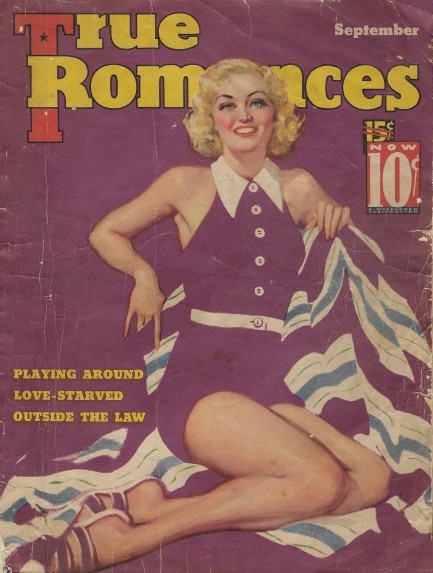
In parts of the world today is Valentine's Day, so in commemoration of this lovely corporate holiday we have this issue of True Romances, with awesome cover art painted by Georgia Warren. It goes way back to 2012. Well, it goes back, really, to 1935. But for us it goes back to 2012, when we picked it up on a trip to Denver. We gave it to one of the Pulp Intl. girlfriends, and she was flattered, but strangely, never read it. She prefers to read about cryptocurrencies for some reason. So after a while we took the magazine back, and now we've torn it apart and scanned it. We actually swore not to damage it, but it was impossible to scan something so fragile and keep that promise, so now Romances is truly dead.
But it's not a great loss, because there isn't much romance in the magazine anyway—certainly not enough to lure P.I.1 away from her cryptocurrency news. There are a few sweet stories, yes, but it's mostly emotional extortion and body shaming. Scan five, titled “Mental Cases I Have Met,” pretty much encapsulates the entire enterprise. Turns out the mental cases were suffering from a lack of confidence in their maxi pads. The P.I. girlfriends say all of this had to be written by men, and they could be right, though most of the credits are feminine. We tend to think the attributions are accurate, but we'll never know. Below we have almost forty scans from this rare publication, and whether the content was created by men in disguise or not, from a 2019 perspective it's all pretty enjoyable. See for yourself. 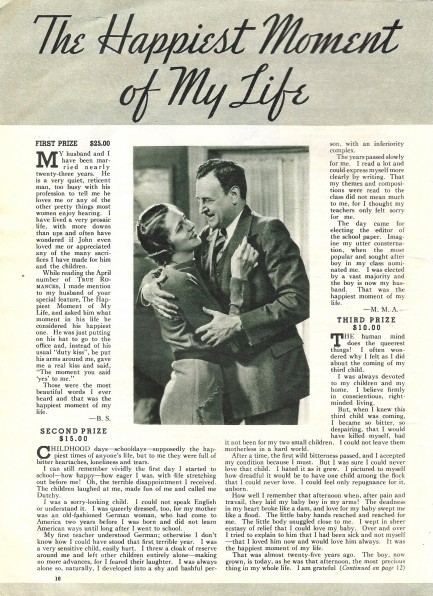 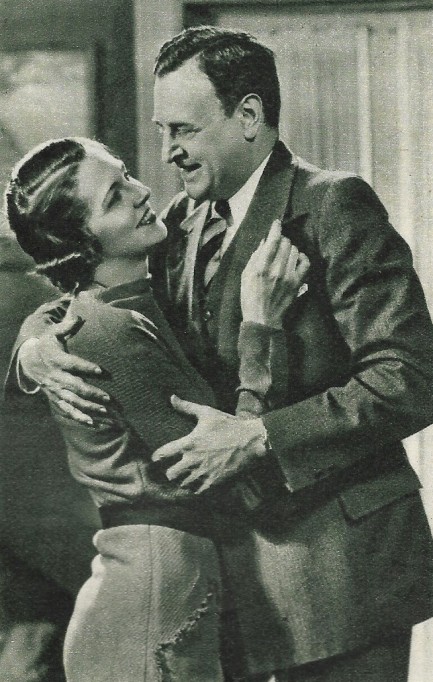 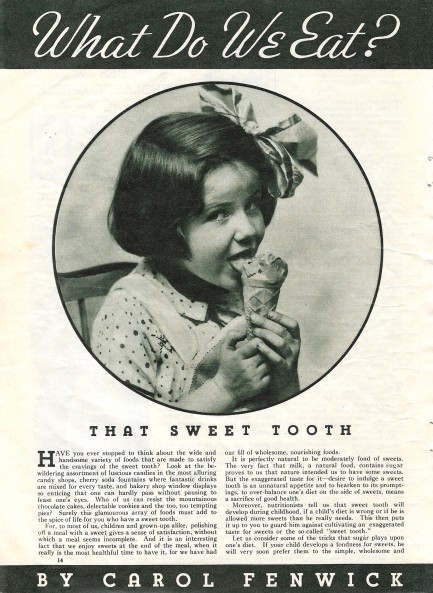 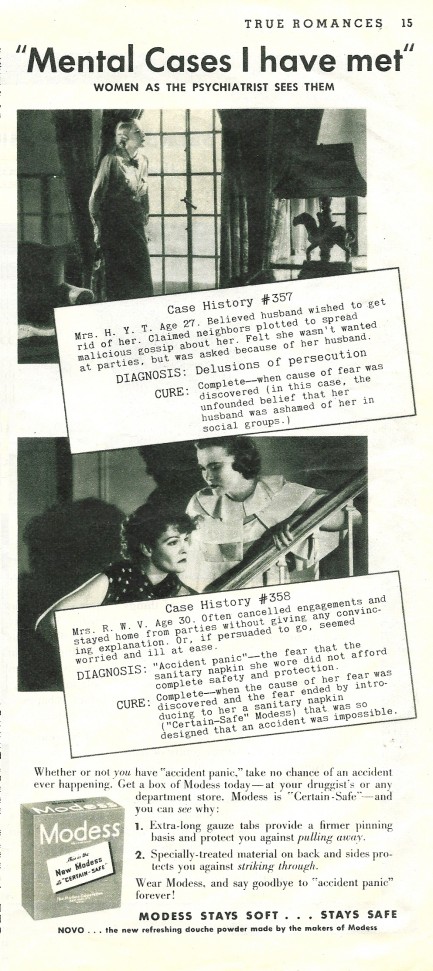 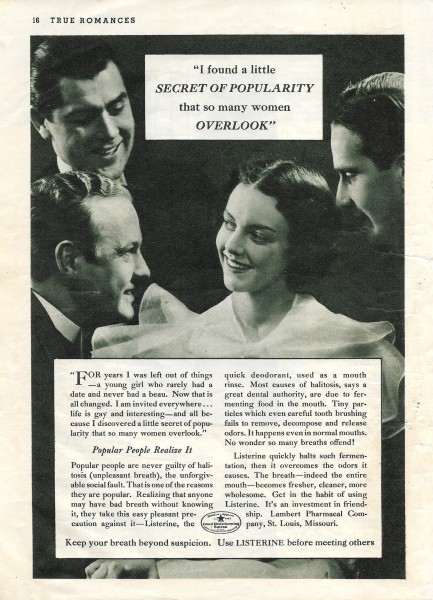 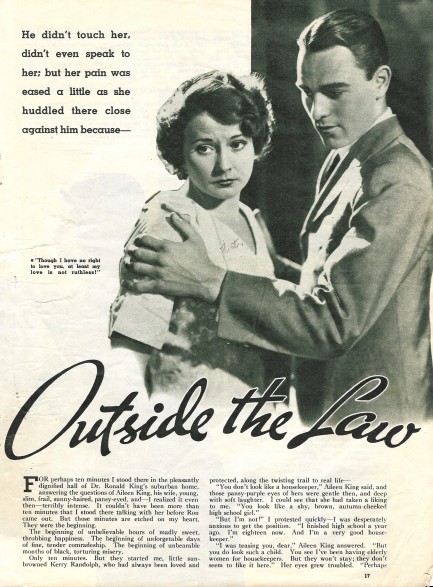 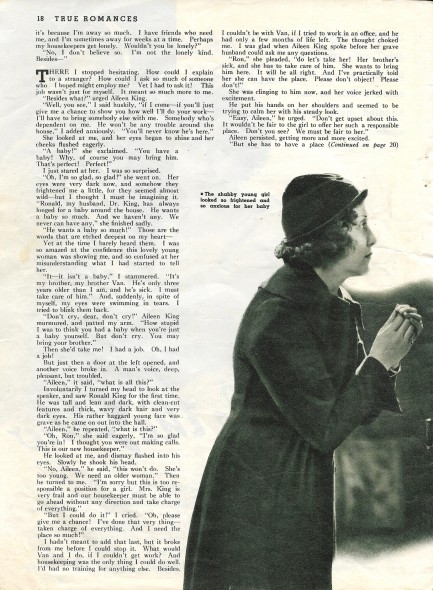 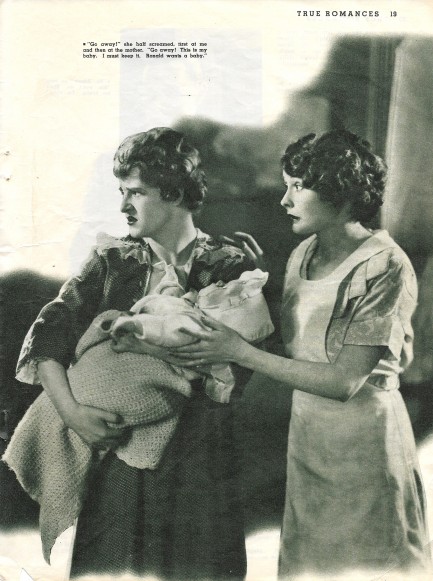 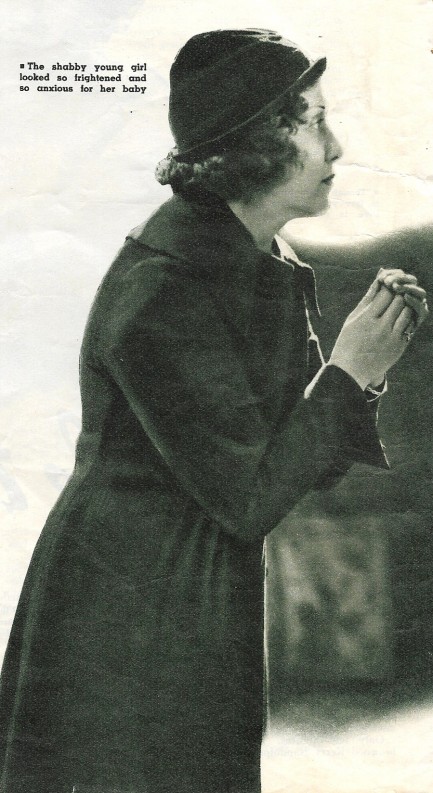 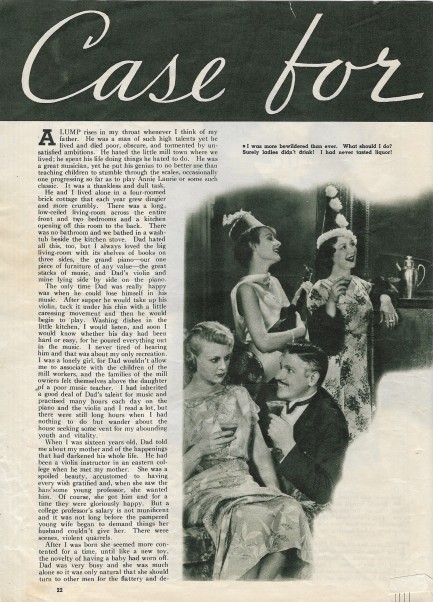 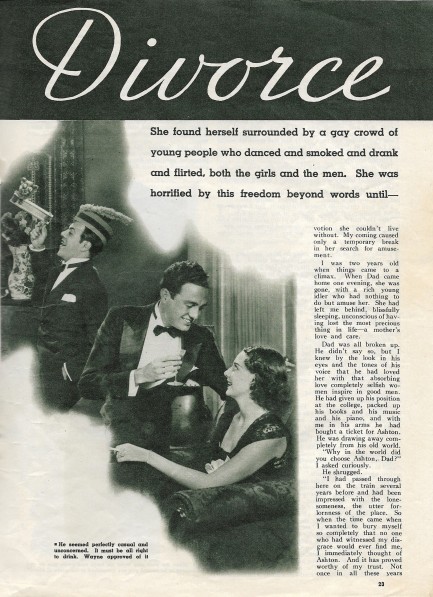 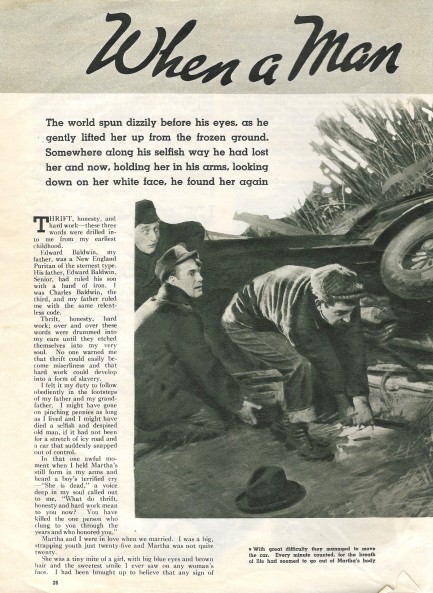 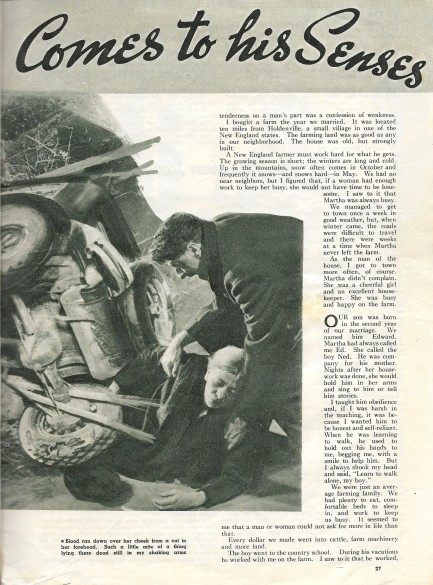 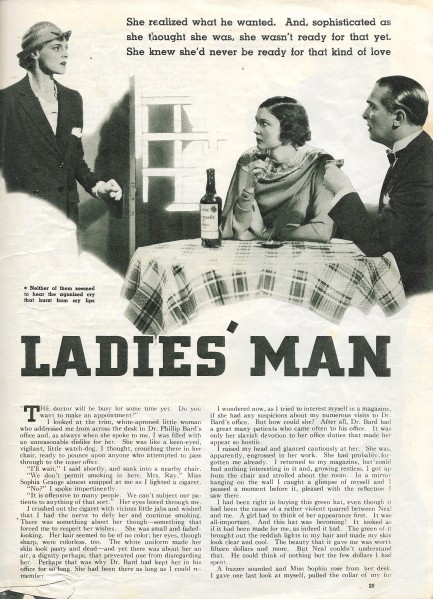 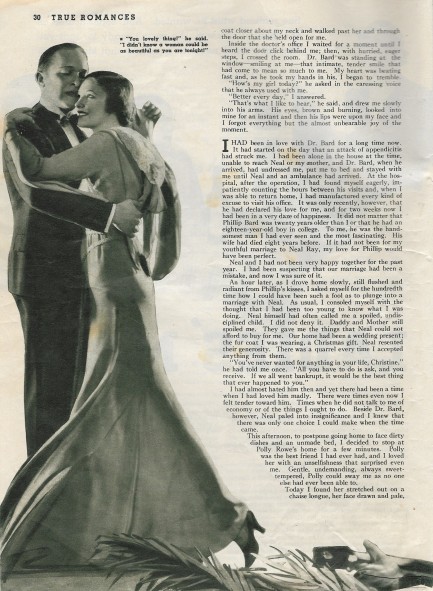 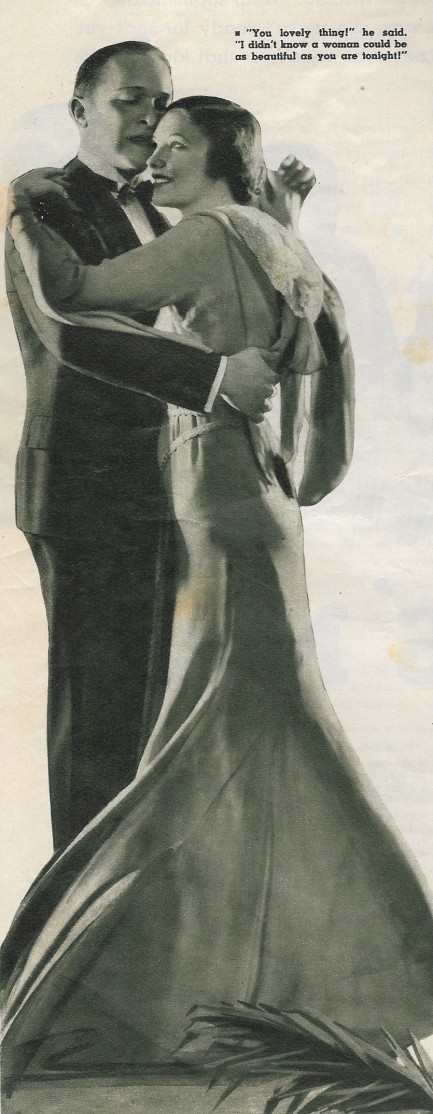 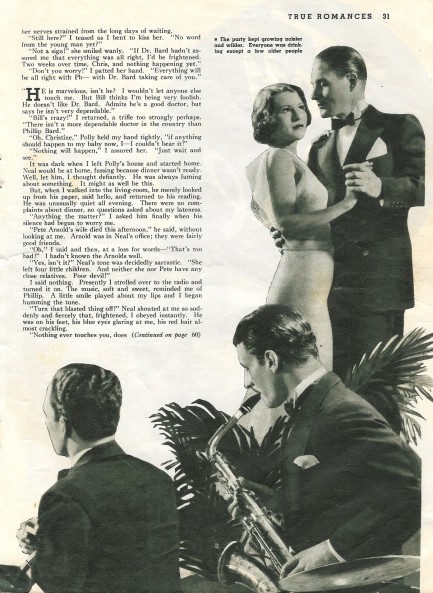 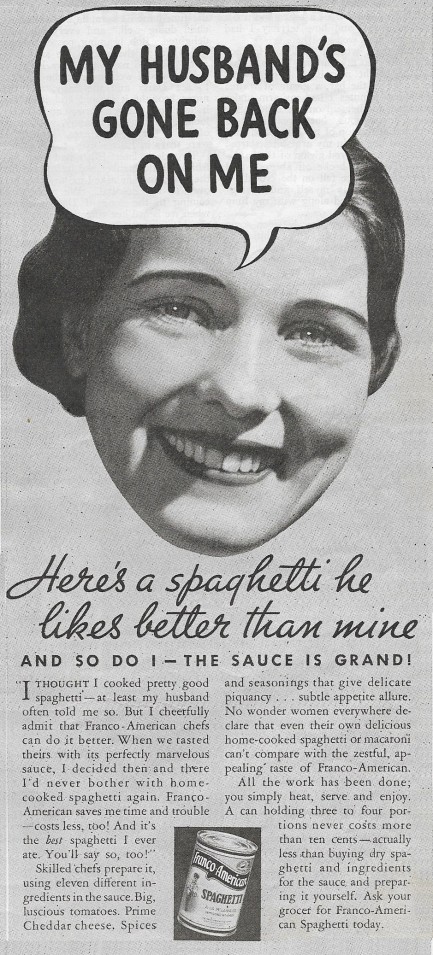 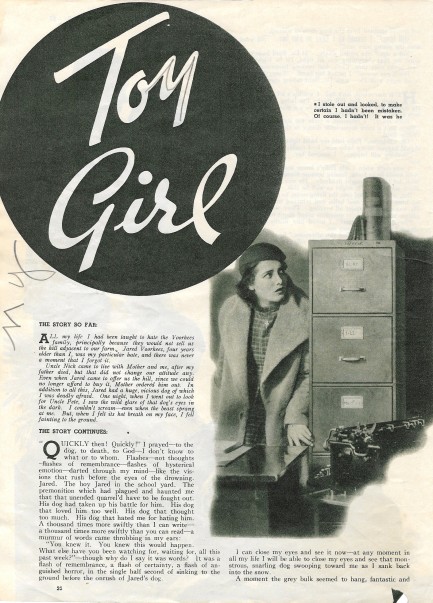 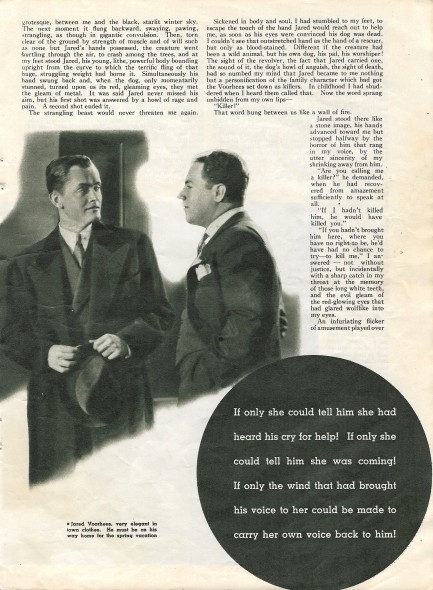 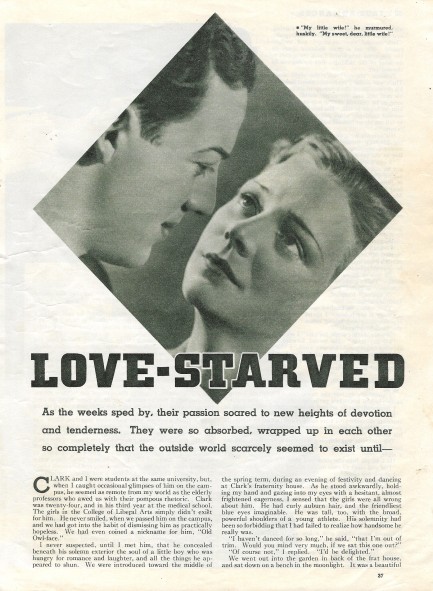 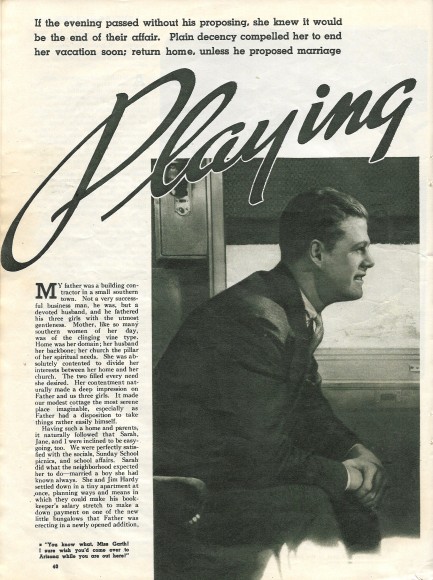 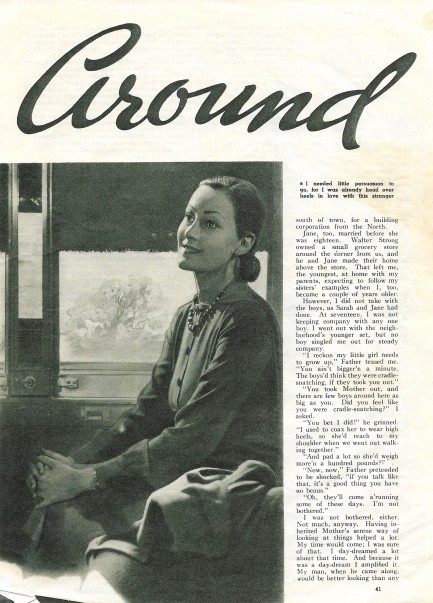 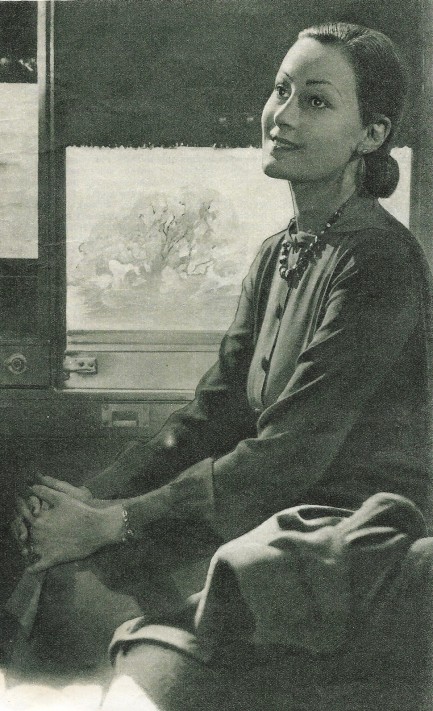 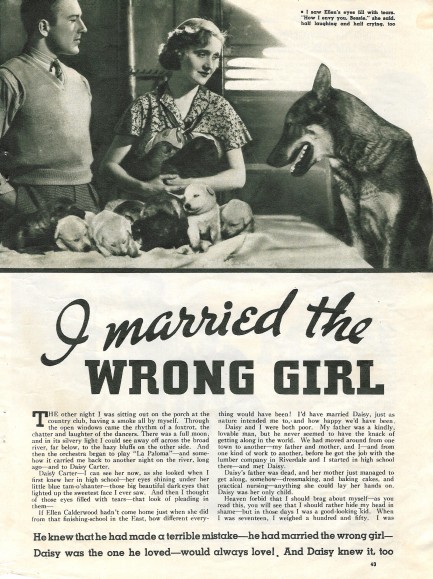 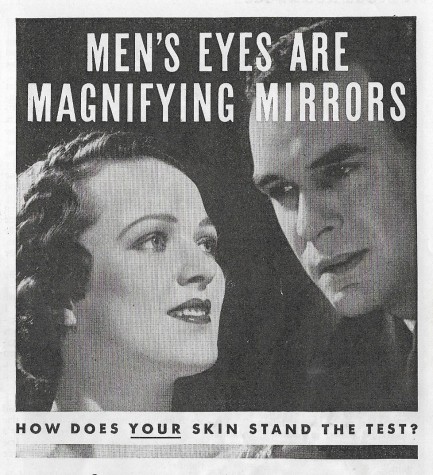  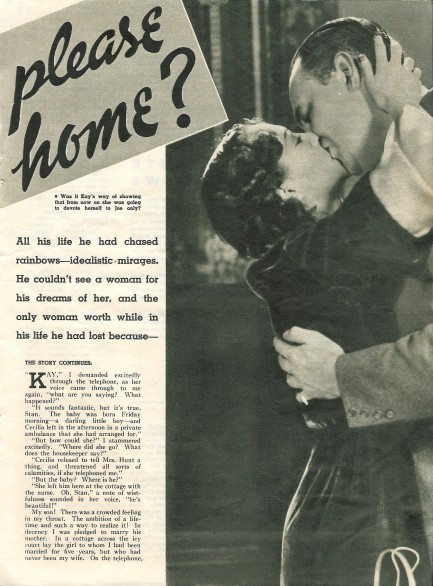 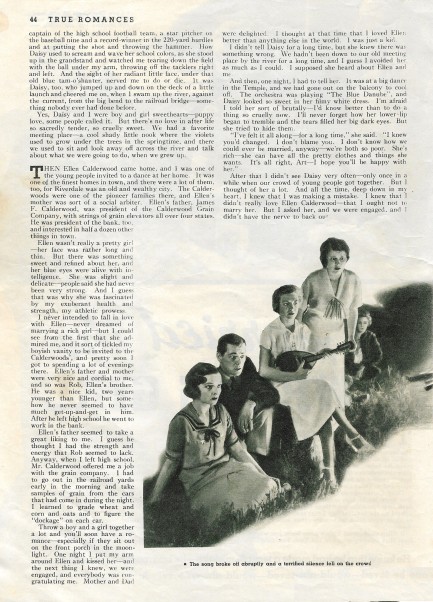 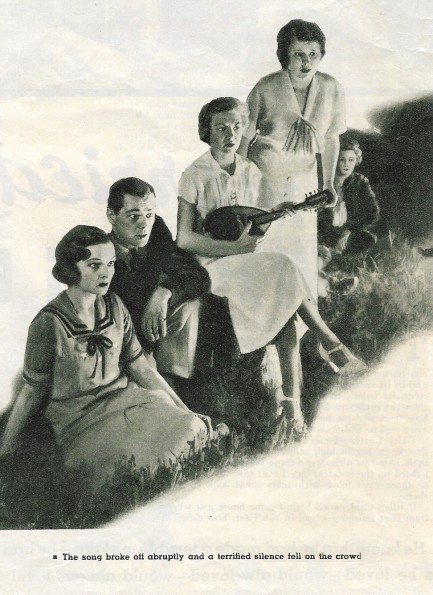 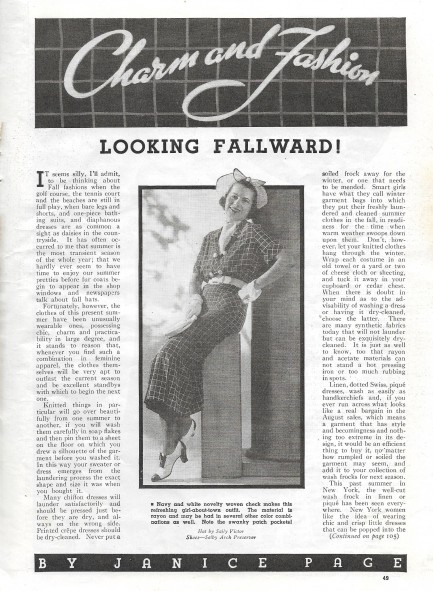 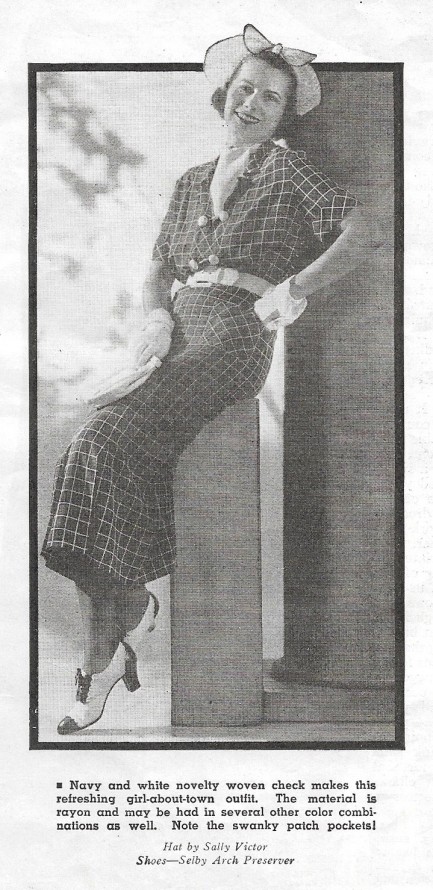 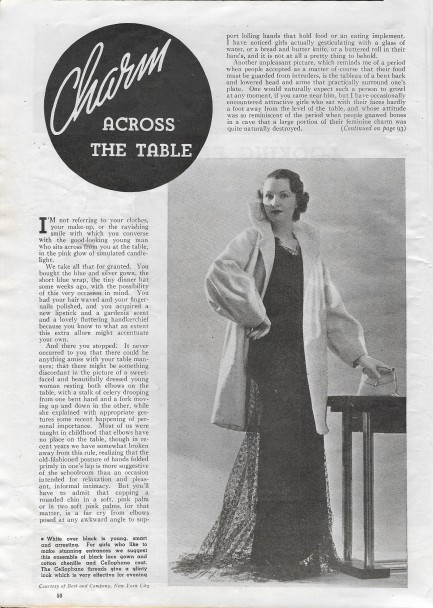 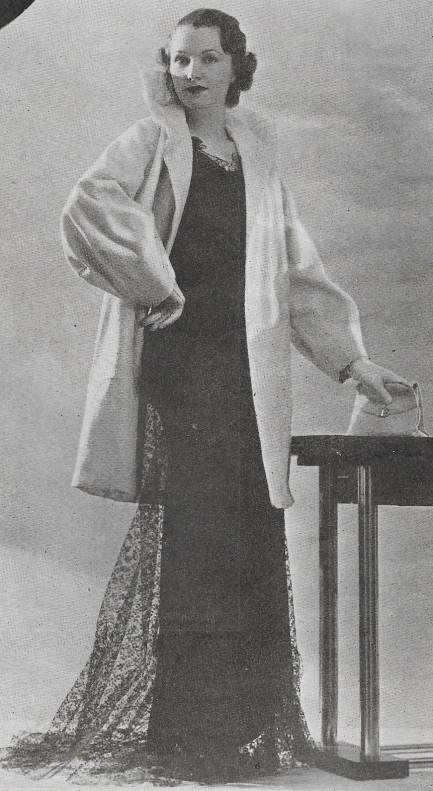  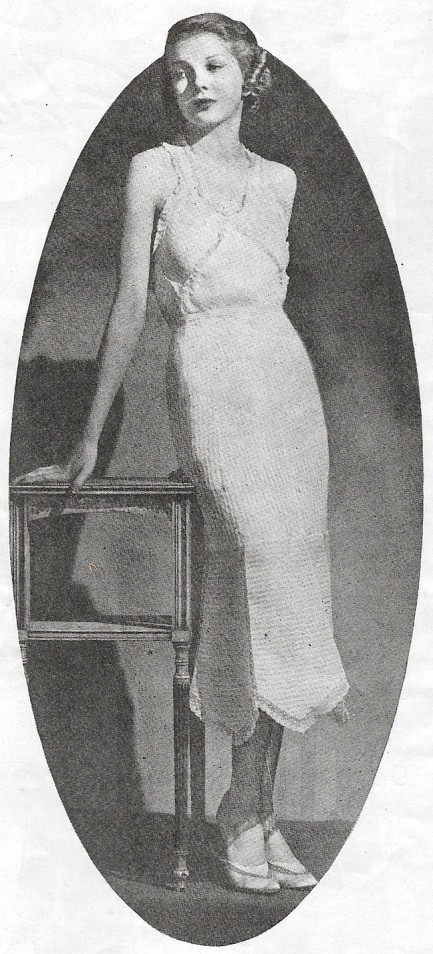 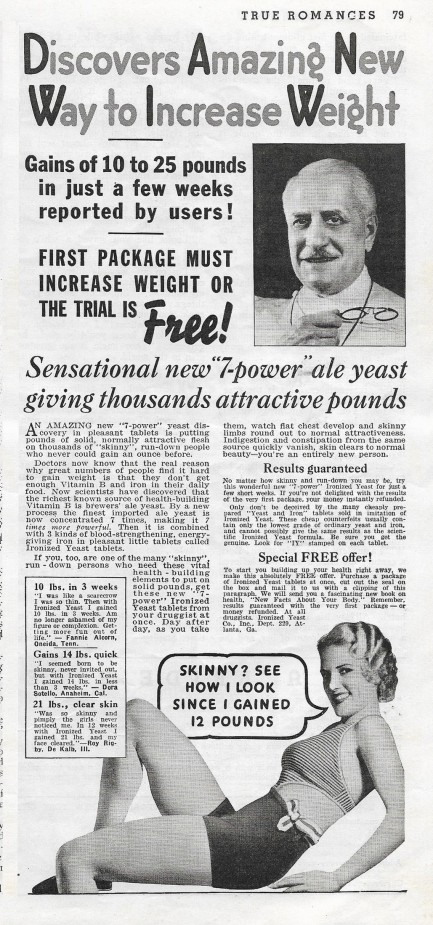 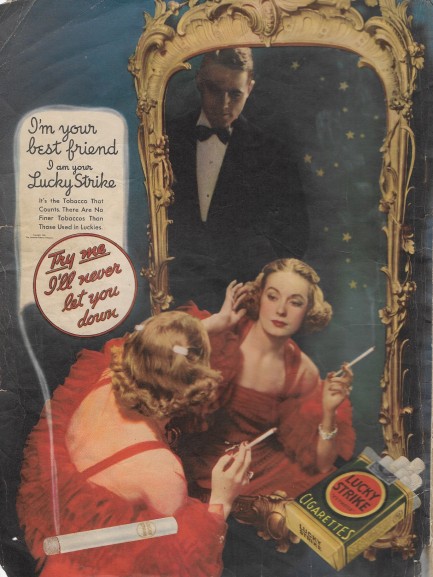
 Seriously? You're stranding me? Just because I said even cold water can't make a man shrink that much? 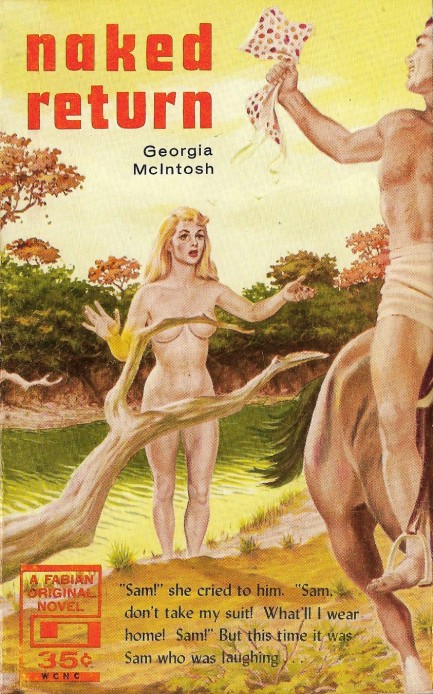
When we first saw Naked Return we thought, “A sleaze novel entirely about a woman who has to get home naked? We can't wait to see how this is drawn out to 144 pages!” But the book isn't about that. There's a literal naked return, alright. It occurs in the first chapter when the lead character Sharon's boyfriend steals her swimsuit, leaving her to get home by walking through the woods and into the middle of a packed garden party. The other 95% of the story is a middling drama about her trying to choose between two men, one in Spain and one in the U.S. Yaaaaawn. But at least the book only cost five dollars. The art is uncredited, and the copyright is 1960
 Monroe goes for a joy ride and bums out fifty-one women. 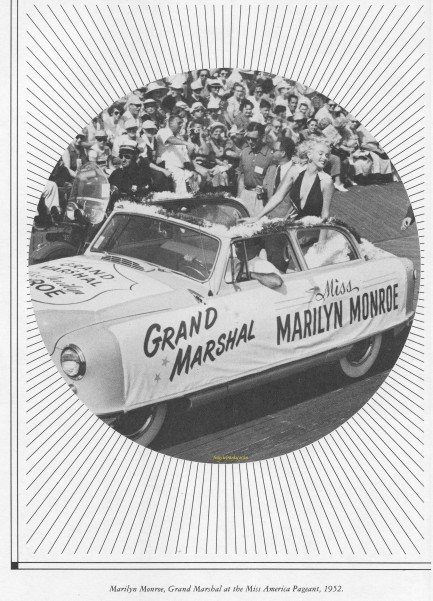
Above is a page from the Japanese celeb magazine Roadshow of Marilyn Monroe having a laugh in the rear of a convertible while acting as Grand Marshall of The Miss America Pageant. The one she headlined was the 1952 event, held in Atlantic City today that year. You'd think all the contestants would have resigned dejectedly after getting a glimpse of their marshall, who was 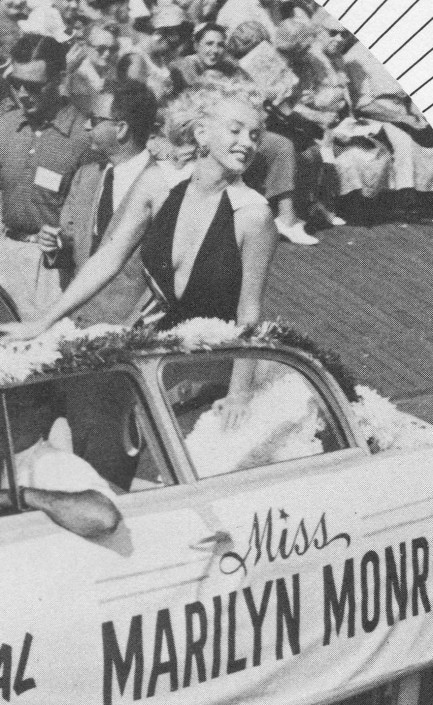 pre-superstardom but was still Marilyn Monroe, yet the pageant actually went on and was won by Neva Jane Langley of Georgia. pre-superstardom but was still Marilyn Monroe, yet the pageant actually went on and was won by Neva Jane Langley of Georgia. A lot of websites get that last fact wrong, which we think is because of Wikipedia. There the pageant winners are listed according to the year they served, not the year they competed. Since the contests were held the previous summer or autumn to choose the upcoming year's queen, most sites say Colleen Kay Hutchins won the pageant Monroe marshalled. Nope. It was Langley, who beat out contestants from all forty-eight states, plus Alaska, Hawaii, and Puerto Rico. There she is below wearing her sash, which says 1953, for her reign beginning the first of the next year. But even in victory she's probably thinking, Now that I've seen Marilyn I'm going to lock myself in a cellar for sixteen months and have someone feed me through a slot in the door. 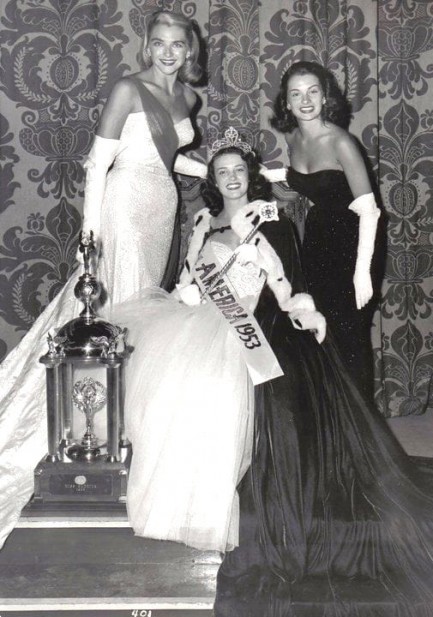
 Tabloid perfects the unauthorized photo leak long before the internet age. 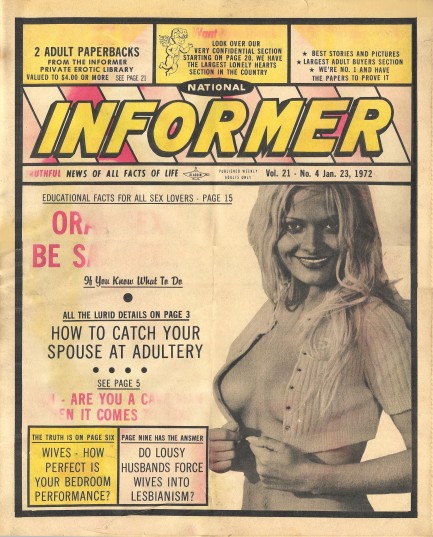
This issue of National Informer was published today in 1972. We love this tabloid, but we'd be have to be blind to not see how low rent it is. It's a mess. Words are misspelled, columns and graphics are crooked, and it's heavily padded. For example there's a random photo of a water buffalo and a sexual quip about its backside. That's pure editorial desperation to fill a gap in the layout. And to make sport of such gentle creatures. Sad!
And speaking of unauthorized usage of gentle creatures, Christina Lindberg pops up yet again in Informer. Rather than in an alleged orgy, this time she appears in the story, “Do Sexually Inadequate Hubbies Force Women To Become Lesbians?” Seems like the editors had a real thing for her. But we have to admit, if we had a bunch of photos of Lindberg around we'd probably squeeze her into our editorial content time after time after time after time too.
Um, where were we? Right—elsewhere in Informer, resident prognosticator Mark Travis makes another set of predictions. You know his track record isn't good, which gives us the idea to have a little quiz. So here you go: which of these two predictions did Travis get more wrong?
1: I predict the ghost of Josef Stalin will appear in Red Square in Moscow during a public ceremony and throw the crowd into a panic.
2: I predict a black governor for the state of Georgia in 1974.
It was a trick question. Both predictions were equally wrong. The ghost of Stalin has not appeared in Red Square, and the state of Georgia, which has a 30% black population, has never had a black governor. Actually, there are no black governors of any U.S. state at the moment, and there have been only four in U.S. history. Bunch of scans below. 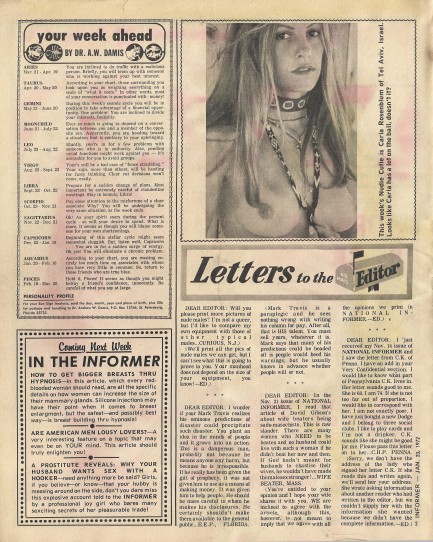  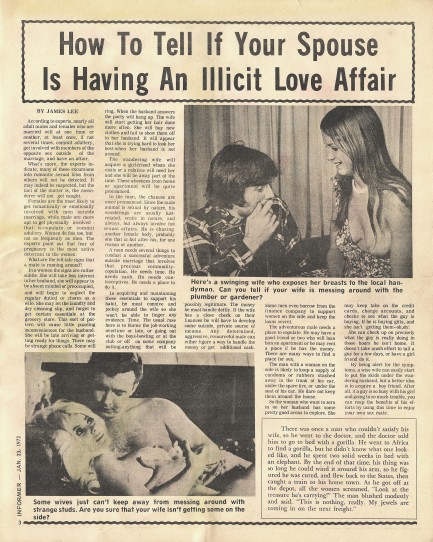 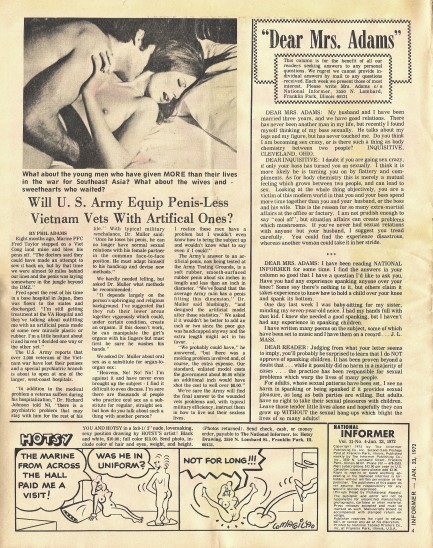 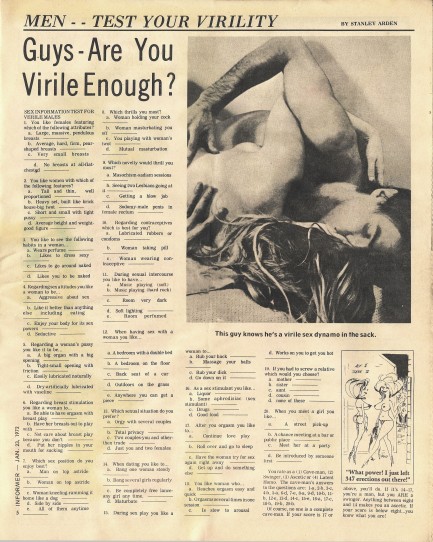 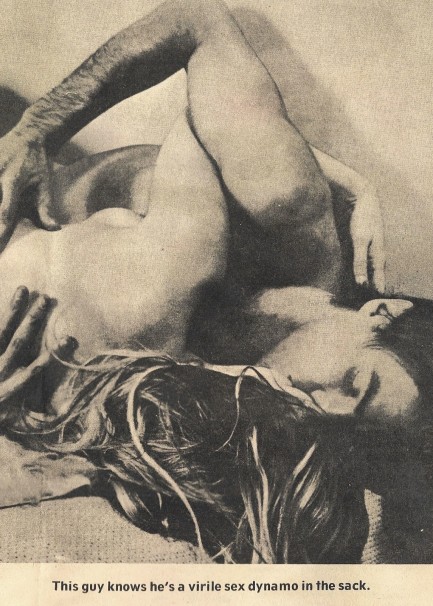 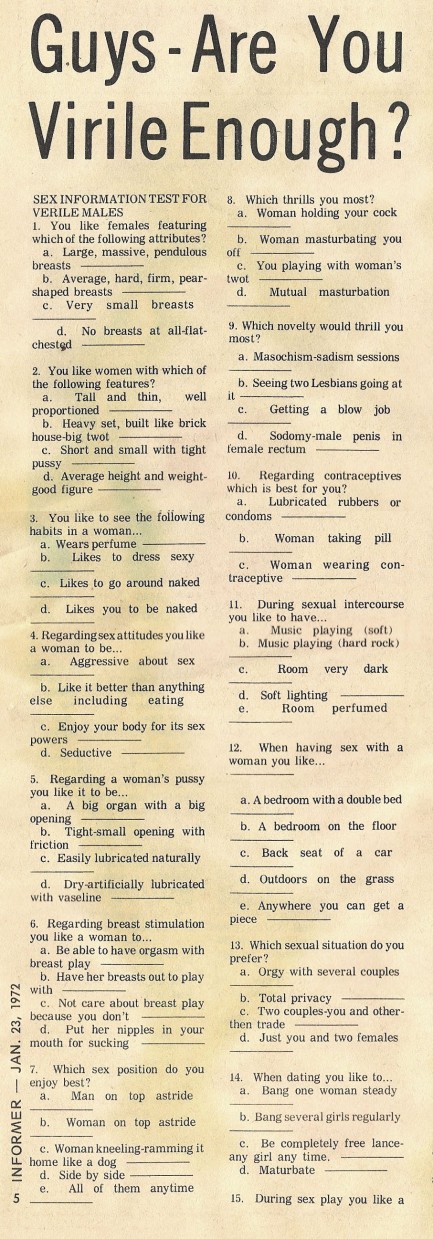 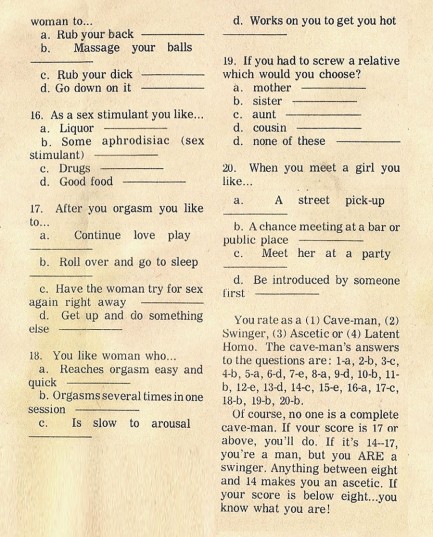 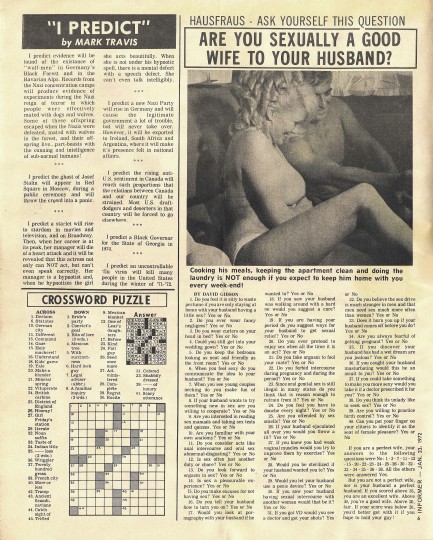 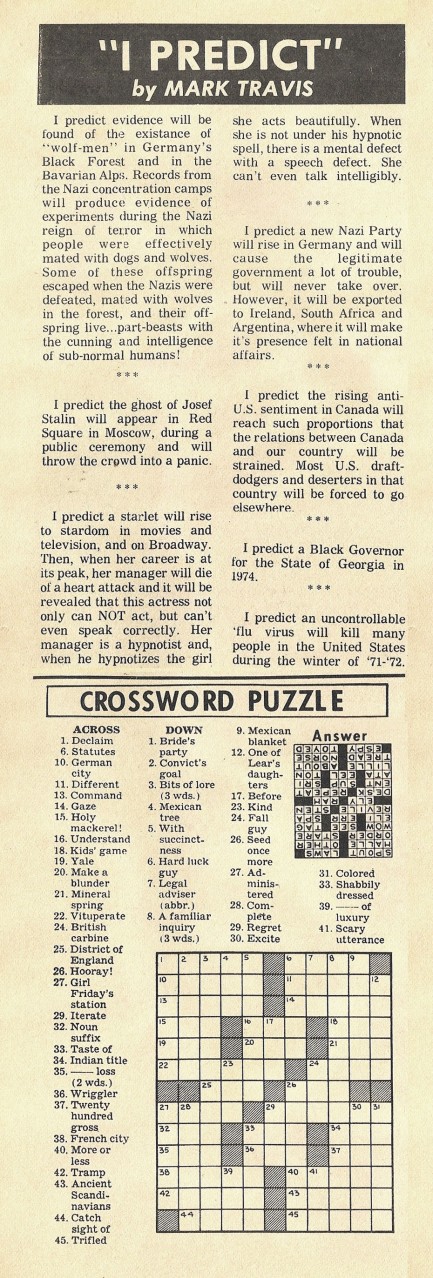 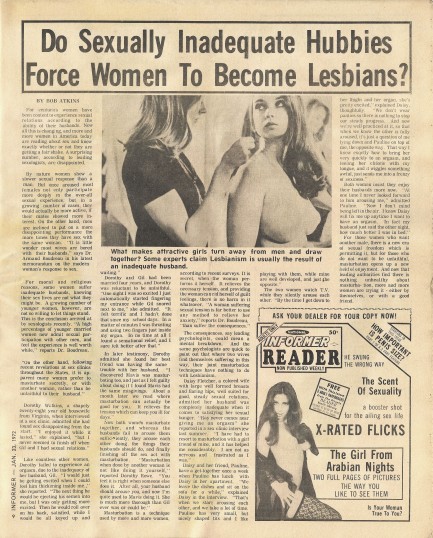 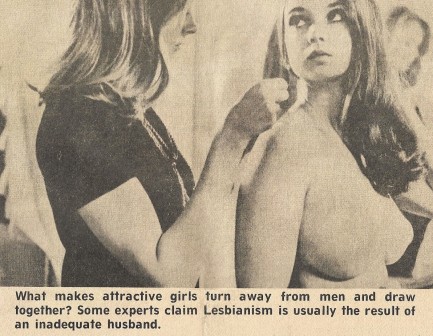 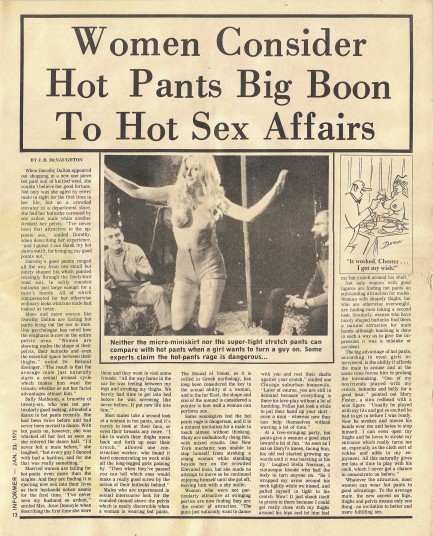 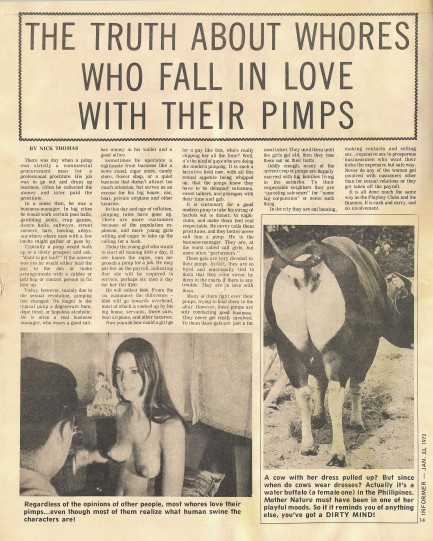 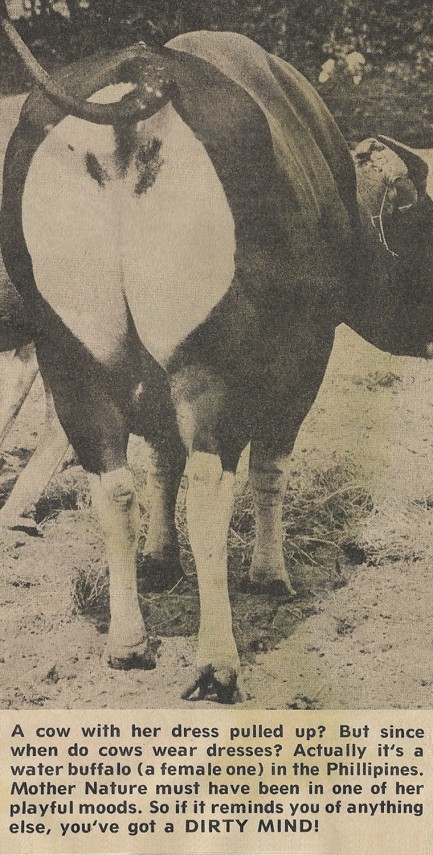 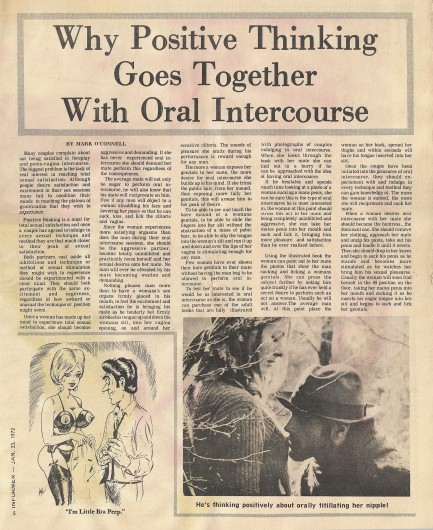 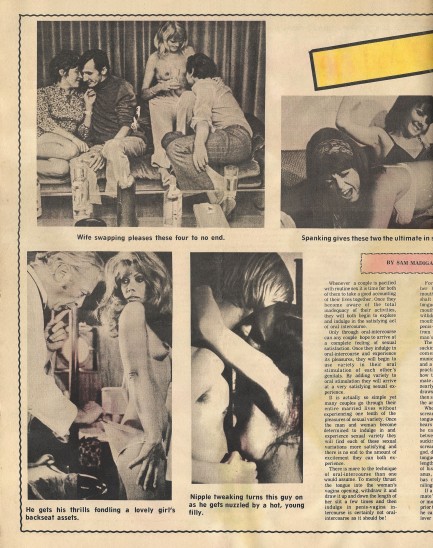 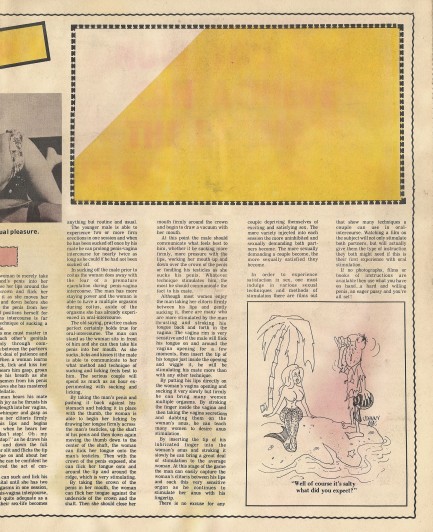 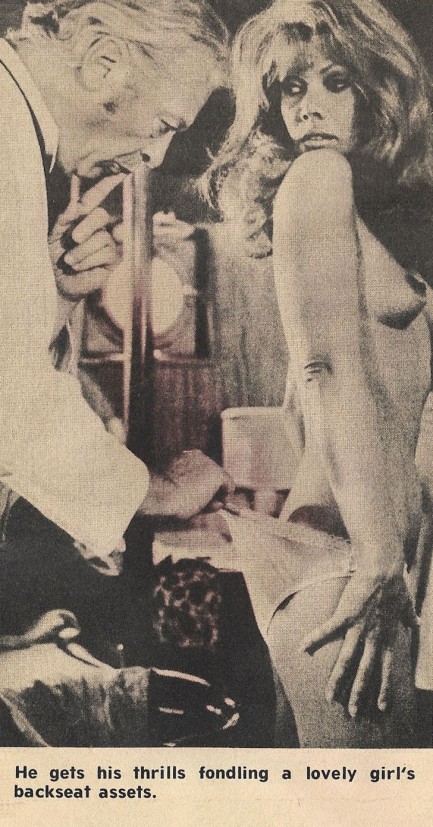 
 Um, Georgia Boy—see if you can put down that unrest you've got happening down around Savannah. 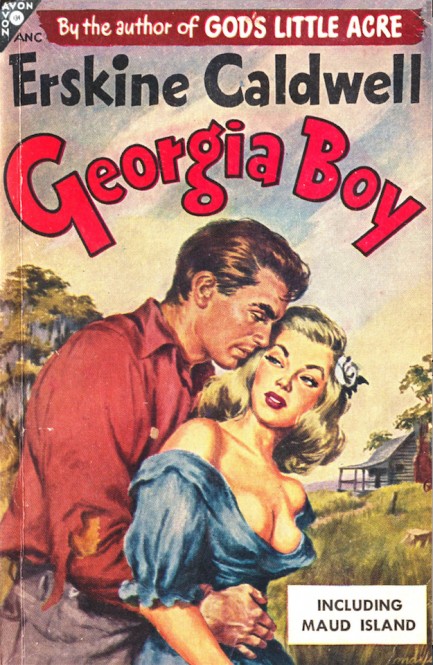
George Mayers does the cover work for the Erskine Caldwell short story collection Georgia Boy, which first appeared in 1943, and in this Avon paperback edition in 1947. While it's a story collection, all the tales are narrated by one young character and mainly discuss the poor Stroup family and their friends, acquaintances, and neighbors. This is Caldwell in a more humorous mode than normal, but the underlying themes of his work—particularly poverty and racism—remain, as in the tale "Handsome Brown's Day Off," in which a black character becomes a living target at a carnival.
We recently encountered this phenomenon in a Jim Thompson novel, and what we thought, or at least hoped, was a case of literary flourish was actual reality—in the Jim Crow south white carnival goers paid to throw baseballs at black men's heads. The balls were generally of a novelty variety, which is to say heavy enough to fly straight, though not hard enough to be lethal, but still. Making the tableau even more horrific was the requirement that the target stick his head through a hole in a jungle backdrop and that he grin and mug for the assembled whites as he tried to dodge the baseballs.
We checked it out in other sources and confirmed the prevalence of this barbaric practice. We also found that carnivals in northern states did it too, though it was far more common down south. Apparently the big fun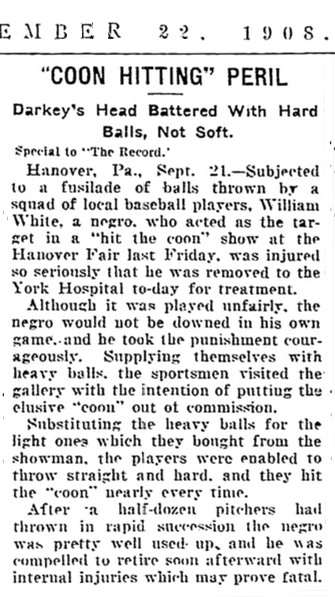 with these spectacles occurred whenever some college or professional pitcher showed up and thrilled the crowd by nailing these poor guys' heads at high velocity. with these spectacles occurred whenever some college or professional pitcher showed up and thrilled the crowd by nailing these poor guys' heads at high velocity. We found a 1908 article, which you see at right, about a group of pro baseball players who substituted normal baseballs for novelty ones and repeatedly beaned a man, putting him in the hospital, where it was feared he might not survive. The target was said to have taken the punishment “courageously,” and of course there was no suggestion of charges being filed.
We also found two other mentions of “African dodgers”—the gentlest term used to describe them—being killed. Things like these need to be remembered, especially in light of today's cultural battles wherein a segment of people seek to propagate a myth of the south as misunderstood. But literature, besides its other value, is often useful for preserving history, as Erskine Caldwell shows. That said, in Georgia Boy we preferred the stories about sex and we have a feeling you will too.
 Hey solider—ever made it in a smoking ruin with the stench of death in your nostrils? 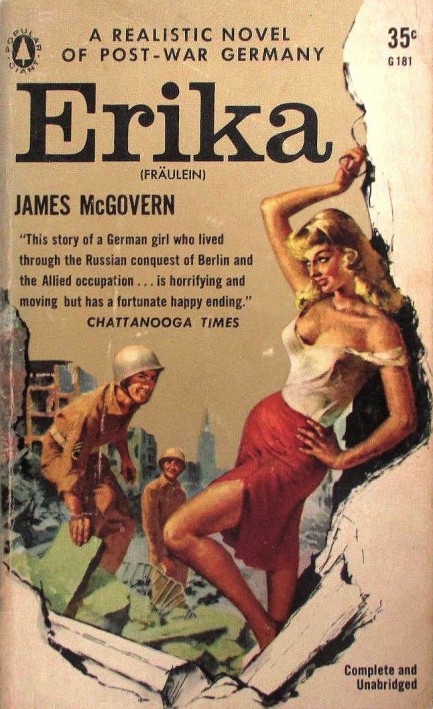
We don't know if there were enough prostitution-in-the-ruins novels written during the postwar period to qualify as a sub-genre, but it seems to us we've seen quite a few of them. We highlighted Scott Graham Williamson's Torment around this time last year, and now we have another—Erika, aka Fräulein, by James McGovern. The book revolves around a woman who is tricked into becoming a prostitute in divided Berlin before finally finding Mr. Right and escaping. She's named Erika Angermann, a symbolic name if ever there was one, hinting at what the men in her life put her through. Erika aka Fräulein was a hit when published in 1956, and became a 1958 movie with Dana Wynter and Mel Ferrer. The book is bit obscure today, but was well regarded in its time. We'll look into how many novels like this are out there and if there are enough maybe we'll put together a group post.

|
 |

The headlines that mattered yesteryear.
1945—Churchill Given the Sack
In spite of admiring Winston Churchill as a great wartime leader, Britons elect
Clement Attlee the nation's new prime minister in a sweeping victory for the Labour Party over the Conservatives. 1952—Evita Peron Dies
Eva Duarte de Peron, aka Evita, wife of the president of the Argentine Republic, dies from cancer at age 33. Evita had brought the working classes into a position of political power never witnessed before, but was hated by the nation's powerful military class. She is lain to rest in Milan, Italy in a secret grave under a nun's name, but is eventually returned to Argentina for reburial beside her husband in 1974. 1943—Mussolini Calls It Quits
Italian dictator Benito Mussolini steps down as head of the armed forces and the government. It soon becomes clear that Il Duce did not relinquish power voluntarily, but was forced to resign after former Fascist colleagues turned against him. He is later installed by Germany as leader of the Italian Social Republic in the north of the country, but is killed by partisans in 1945. 1915—Ship Capsizes on Lake Michigan
During an outing arranged by Western Electric Co. for its employees and their families, the passenger ship Eastland capsizes in Lake Michigan due to unequal weight distribution. 844 people die, including all the members of 22 different families. 1980—Peter Sellers Dies
British movie star Peter Sellers, whose roles in Dr. Strangelove, Being There and the Pink Panther films established him as the greatest comedic actor of his generation, dies of a heart attack at age fifty-four.
|

|
|

It's easy. We have an uploader that makes it a snap. Use it to submit your art, text, header, and subhead. Your post can be funny, serious, or anything in between, as long as it's vintage pulp. You'll get a byline and experience the fleeting pride of free authorship. We'll edit your post for typos, but the rest is up to you. Click here to give us your best shot.

|
|





























































 pre-superstardom but was still Marilyn Monroe, yet the pageant actually went on and was won by Neva Jane Langley of Georgia.
pre-superstardom but was still Marilyn Monroe, yet the pageant actually went on and was won by Neva Jane Langley of Georgia.
























 with these spectacles occurred whenever some college or professional pitcher showed up and thrilled the crowd by nailing these poor guys' heads at high velocity.
with these spectacles occurred whenever some college or professional pitcher showed up and thrilled the crowd by nailing these poor guys' heads at high velocity.






































































